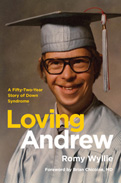
 |
Loving Andrew: A Fifty-Two-Year Story of Down Syndrome
by Romy Wyllie
CreateSpace Independent Publishing Platform
When Andrew Wyllie was born in 1959, the only other Down syndrome baby his doctor had delivered had been sent away. Andrew’s parents took the risk to raise their son despite the doctor’s warnings. Andrew became an integral member of his family—educable, able to work, fall in love, and live in a supported setting. He traveled and participated in recreational activities such as horseback riding, running, and bowling. He developed mental illness and other health complications at thirty-eight and passed away at age fifty-two.
The book’s title emphasizes the author’s deliberate choice to nurture a son with multiple challenges. Her organized style—partitioning the narrative into chronological sections with only salient details selected from the family’s timeline—hints at her disciplined, strategic approach to parenting. She strives to hold Andrew to the same expectations as his two siblings. He receives equal consequences for offenses, like stealing money from his dad’s wallet, even when explanations as to why require patience and commitment. Andrew is praised for his accomplishments, even though bagging groceries for decades might pale in comparison to his siblings’ advanced degrees. With practical wisdom gleaned from anecdotes, the book encourages and guides other families of Down syndrome children.
The narrative includes interviews with Andrew’s teachers, friends, relatives, and caregivers. These voices, coupled with research from studies and other resources, bring additional depth to the book. The author compares her experience with two other mothers whose Down syndrome daughters are born in the 1990s. She questions why, with increased opportunities for disabled people now available, pressures to terminate pregnancies of abnormal babies outweigh the choice to keep them. She firmly advocates each couple’s right to choose how to proceed.
A 2014 Eric Hoffer Book Award Memoir Category Honorable Mention